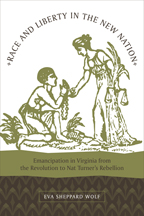
312 pages / 6.00 x 9.00 inches / 1 map
By examining how ordinary Virginia citizens grappled with the vexing problem of slavery in a society dedicated to universal liberty, Eva Sheppard Wolf broadens our understanding of such concepts as freedom, slavery, emancipation, and race in the early years of the American republic. She frames her study around the moment between slavery and liberty--emancipation--shedding new light on the complicated relations between whites and blacks in a slave society. This well-informed and carefully crafted book outlines important and heretofore rarely examined changes in whites' views of blacks and liberty in the new nation. Combining a study of manumission documents with an investigation of the shifting public discussions over slavery, Race and Liberty in the New Nation demonstrates that the high point of antislavery sentiment in Virginia occurred during the 1830s and not the Revolutionary period. At the same time, it shows how white Virginians' attitudes toward blacks hardened during the half-century that followed the declaration that "all men are created equal."
“Eva Sheppard Wolf’s Race and Liberty in the New Nation is an excellent example of how material and symbolic forces may be integrated into a convincing and comprehensive whole. . . . Wolf’s contribution to the rich scholarship on race in the early republic is sobering, convincing, and necessary, and readers will benefit from her labor.”—Journal of American History
“By any measure, Race and Liberty is an impressive achievement.”—Southern Quarterly
“This book [is] essential for specialists. . . . Wolf’s attention to historical context, her narrative skill, and her patience in defining key concepts make the book a superb choice both for courses on slavery and for more general courses on early American history.”—Journal of Southern History
“Wolf has made an important intervention in one of the perennial debates in American history. Hers will not be the last word—it’s hard to imagine a last word on these subjects—but she has raised issues that future scholars will need to consider.”—William and Mary Quarterly
“A thought-provoking and important book. . . . The research is both extensive and deep. . . . It will certainly contribute mightily to our understanding of those historical phenomena.”—Virginia Libraries
Found an Error? Tell us about it.